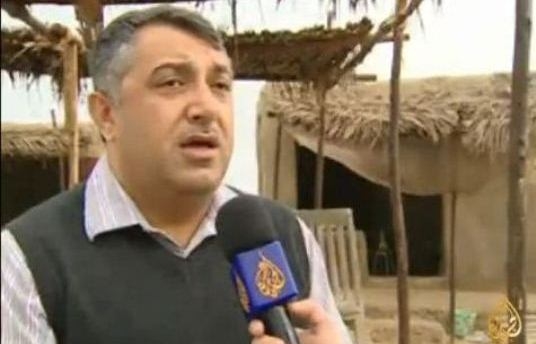أهل السينما: حمد علي علي
24 مارس 2011

ما الذي يتطلبه دخول “المجال“؟ حمد علي علي، منتج بقناة الجزيرة للأطفال للعديد من مشاريع الأفلام والبرامج التلفزيونية، يخبر مؤسسة الدوحة للأفلام عن عمله كمنتج والتحديات التي يواجهها في عمله
حمد علي علي هو مخرج ومنتج قطري. نال شهادة الفنون الجميلة في الانتاج السينمائي من جامعة تشابمن في أميركا. عمل بوزارة الثقافة في الدوحة وساهم في العديد من المشاريع كمهرجان “مهرجان الخيال السينمائي”. عمل علي علي أيضاً كمهندس صوت في فيلم “عودة المها، 2007” والذي فاز بجائزة أفضل فيلم وثائقي وأفضل إخراج في مهرجان الراديو والتلفزيون العربي بتونس. أنتج علي علي الفيلم القصير “سائق الأجرة” الذي تم عرضه في أماكن عديدة في العالم؛ بالاضافة إلى فيلم “عبق الظلال” الذي فاز بميدالية فضية بمهرجان الراديو والتلفزيون الخليجي. يعمل حالياً كمنتج في قناة الجزيرة للأطفال للعديد من مشاريع الأفلام والبرامج التلفزيونية.
مؤسسة الدوحة للأفلام: شكراً لموافقتك على مقابلتنا حمد! نرغب بأن نعرف المزيد عن تجربتك التلفزيونية والسينمائية. كيف تختلفان؟ وهل تكملان بعضهما البعض؟
حمد: هناك اختلاف كبير في باعيهما – هناك جمهور خاص بالتلفزيون. في حالتي، العمل الذي أنتجه موجه للجمهور العربي، وتحديداً للأطفال. لكن في حالة الأفلام، فإنك معرّض للعديد من الجماهير والجنسيات، والأعمار المختلفة. يمكنك أن تبلغ العالم بواسطة السينما.
مؤسسة الدوحة للأفلام: ما هو برأيك دور المنتج في الفيلم؟
حمد: المنتج مسؤول عن إنهاء الفيلم في الوقت المحدد ووفقاً للميزانية المحددة. هذا باختصار. يجب أن تكون معنياً به من البداية، من مرحلة تطوير النص السينمائي، وصولاً حتى انتهائه. قد يبدو عملاً جافاً، لكن يجب على المنتجين أن يكونوا خلاقين، من خلال معرفتهم بكيفية تطبيق الرؤى التي تبدأ كتابة على ورق، ولكنها تغطي الممثلين، والمونتاج وهندسة الصوت، وكيفية ظهوره أمام الجمهور في النهاية.
مؤسسة الدوحة للأفلام: تعمل بشكل مستمر مع أخويْك المخرجيْن حافظ ومهدي. كيف هو العمل معهما؟
حمد: نحن الثلاثة مهووسين بالسينما، كل واحد بطريقته الخاصة. نستمتع بالعمل مع بعضنا البعض ودعم بعضنا. إنها متعة حقيقية حين نبدأ بمناقشة مشروع أو تبادل الأفكار والتحضير للتصوير. نحرص دائماً على تقسيم المهام لتسهيل العمل الانتاجي بشكل احترافي.
مؤسسة الدوحة للأفلام: ما هي التحديات الأساسية التي تواجهكم كمخرجين عرب، حين تعملون على الأفلام؟
حمد: إذا سألت هذا السؤال لأي مخرج عربي، سيأتيك الجواب ذاته: التمويل. هذا هو الجزء الأصعب في مجالنا – إذا لم تملك التمويل اللازم، لا يمكنك إنتاج فيلم. نعتمد بشكل جزئي على التمويل الدولي لكي نتمكن من إنتاج أكثر ما نحبه، وهدفنا دائماً هو العمل النوعي.
مؤسسة الدوحة للأفلام: عملت على فيلم اسمه “قرنقعوه” لقناة الجزيرة للأطفال. أخبرنا المزيد عنه، وعن معنى عنوانه؟
حمد: القرنقعوه هو احتفال تقليدي يجري في الليلة الرابعة عشرة لشهر رمضان من كل عام، وهو شهر الصوم عند الاسلام. في هذه الليلة، يجتمع الأطفال ويغنون الأغاني الفلكلورية الخاصة بهذه المناسبة، وهم يرتدون أزياءً مبهرجة تقليدية. ثم يأخذون بالتنقل بين منازل أقاربهم، ليملؤوا أكياسهم بالمكسرات والفواكه المجففة. والفيلم هو حول قصة دانا البالغة من العمر 9 سنوات، التي تستعد للاحتفال بالقرنقعوه مع عائلتها. تذهب لشراء زي للمناسبة وبعض الحلوى والمكسرات والفواكه المجففة. هذه المناسبة عزيزة على قلبها، وقد قررنا إظهار تاريخ هذا الاحتفال عبر حكاية ترويها لها جدتها.
video#1
مؤسسة الدوحة للأفلام: ما هي المشكلات التي واجهتك أثناء إنتاجك هذا الفيلم، بما أنك صورته في صحراء الدوحة؟
حمد: الطقس كان المشكلة الكبرى! إنه يتلاعب بك، خاصة وأننا صورنا في الصحراء. وكان الموقع بعيداً أيضاً، لذا كان علينا نصب مخيم كامل، وتوقّع كل احتياجاتنا كي نتأكد أنه لا يفوتنا أي شيء. كما أن العمل مع الأطفال ممتع، ولكنه بحاجة للكثير من الصبر والتحمّل. كانت تجربة رائعة.
مؤسسة الدوحة للأفلام: لو طلبنا منك أن تختار فيلماً واحداً، من أي نوع وعصر، ما هو فيلمك المفضل ولماذا؟
حمد: فيلمي المفضل هو “المواطن كاين”. قصته عميقة وعناصره غنية جداً – وهذا بحد ذاته يجعل من فيلم “المواطن كاين” ضروري للمشاهدة لأي عاشق سينما.
إنه أيضاً أحد أهم الأفلام على الإطلاق. فهو معروف ببنيته الروائية المبدعة، وتصويره السينمائي عميق التركيز، وموسيقته، والسيناريو، وبالطبع، تجسيد شخصيته الأساسية. “المواطن كاين” بكل بساطة هو الأفضل.
مؤسسة الدوحة للأفلام*: ما الذي تعنيه لك صناعة الأفلام؟
حمد: فن صناعة الأفلام ليس مجرد فن بصري؛ إنه انصهار لكل أشكال الفنون في بوتقة واحدة. إزا جمعت كل أشكال الفنون البصرية – الرقص، والموسيقى، والسينما، والتمثيل – يصبح لديك فيلم. إنه يعبّر عن أكثر اللحظات شاعرية بطريقة تجعل المشاهد يتفاعل ويلتحم بها، لأنها تبدو حقيقية.
مؤسسة الدوحة للأفلان: ما هي الرسالة التي ترغب بإيصالها إلى صناع الأفلام الجدد؟
حمد: إعملوا بكد لتحقيق أحلامكم، وأحبوا عملكم. وإذا كنتم تعملون على فيلم، فليكن هدفكم دائماً الجمهور العالمي، ليس فقط المحلي.